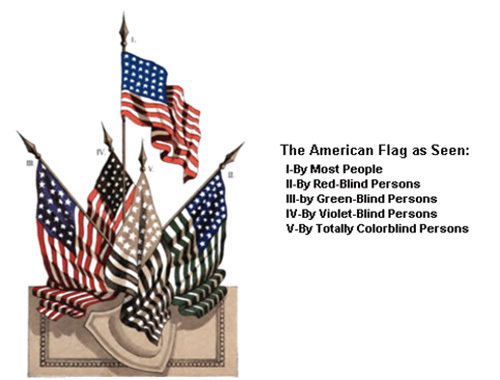
Which parent gives you the most dominant genes?
October 12, 2011

- Related Topics:
- Dominant and recessive,
- DNA basics,
- X linked inheritance
An undergraduate student from Indiana asks:
“Which parent gives you the most dominant genes?”
Except for a few special cases (see below), it doesn't really matter which parent gave you which gene. If a gene version is dominant, it will dominate whether it came from mom or dad.
Your chances of getting a dominant trait don't depend on which parent it came from. If mom gives you a dominant brown eye version of an eye color gene, odds are you'll end up with brown eyes. Same thing if dad passes the same gene. In neither case would you have higher odds for getting brown eyes.
Now that isn't to say that if mom has brown eyes then all her kids will too. They could end up with the other parent's recessive blue or green eyes. Or an eye color that neither parent has!
This is how brown-eyed parents end up with a blue-eyed child. Or how two parents who don't have red hair have a redheaded baby.
As you can see, genetics is a complicated business. But one thing we do know...a child isn’t more likely to favor one parent over the other. Which traits you get depend on the combination of genes you get from both parents.
What I'll do for the rest of the answer is explain a bit about how genes work. Then I'll focus on some situations where the parents do matter. As you'll see, this is usually when a trait is on the X chromosome.
Dominant and Recessive
Let's say that a child has a mom with brown eyes and dad with blue eyes. In general, brown eyes are dominant to blue. That means that if you have the DNA for both brown and blue, you’ll have brown eyes.
(I’ll also note that it’s more complicated than I’m about to describe here. But the general pattern holds true, where darker eyes are more dominant than lighter ones.)
Since brown eyes are dominant, there are two possibilities for mom. She can have two copies of the brown version of an eye color gene (“BB”, as geneticists like to say). Or she could have one brown (B) and one blue (b) version of that gene, or “Bb”.
To make things easier, we will say that she is BB (both genes are the brown version). Since the dad has blue eyes, he has two copies of the recessive blue version. He is bb.
Each parent will pass one copy of their eye color gene to their child. In this case, the mom will always pass B and the dad will always pass b. This means all of their kids will be Bb and have brown eyes. Each child will show the mom's dominant trait.
Now if we flip things around where the father has two brown versions (BB) and the mom has two blue ones (bb), the child will still end up Bb and having brown eyes. It doesn't matter if B came from mom or dad. It only mattered that the child got a B.

I don't want you to think that if one parent shows the dominant trait, all their children will too. They may not. Let me give another eye color example to show you what I mean.
Imagine a mom with one version of the brown and one version of the blue eye color gene. She is Bb and has brown eyes. Dad is bb and has blue eyes.
These are the same eye colors that the parents had in the first example. But the result could turn out very differently.
In this example, the kids would each have a 50% chance of having mom's brown eyes and a 50% chance of having dad's blue eyes. (This is because mom has a 50% chance of passing her B and a 50% chance of passing her b.) They could end up with mom's dominant trait or dad's recessive one. Which one is a simple matter of chance.
And if we take a Bb dad (brown eyes) and a bb mother (blue eyes), there is still a 50% chance for the child to have blue eyes. Again it didn't matter which parent gave which gene version. What was important is that these two gene versions were involved.
Of course, eye color is harder to predict than I’m describing here. There’s more than just one gene that affects what color eyes you’ll have! But it’s still a useful example.
This is true for many, many traits besides eye color. But not all of them. Sometimes it matters whether your mom or dad has a dominant trait.
Blame (or Thank) Mom
Through our discussion so far, you may have picked up on the fact that we have two copies of our genes - one from mom and one from dad. But this isn't true for every gene.
Whether you are a boy or a girl mostly depends on whether you have an X and a Y chromosome or two X's. If you have an X and a Y, then you are usually a boy. If you have two X's, then you are usually a girl.
This matters for our discussion because it means that girls (and so moms) have two copies of all the genes on the X chromosome while boys (and dads) have just one. The genes on mom's X chromosome will dominate for her sons whether they are dominant or recessive.
Let's look at color blindness as an example to figure out why.
Imagine that mom is colorblind. Since being colorblind is recessive, she has two copies of the color blind version of the gene (c). Geneticists say she is Xc Xc because the recessive version is on the X chromosome.

In our case, dad isn't color blind. Since he has just one X chromosome, he has a single copy of the version of the gene that lets him tell red from green. He is XC Y. (The XC means he has the dominant version of the color vision gene on his X. The Y has no color vision gene on it and so is here as a marker.)
OK, now what happens when these two parents have sons? They are all colorblind like their mother. Her recessive trait dominates!
Let me take you through how this happened. Since the child is a boy, we know dad passed his Y (otherwise the child would be a girl). This doesn't contribute any color vision genes.
Mom will pass one of her Xc's to her son. The son now has an Xc and a Y. He has no dominant color vision gene version to overcome his color blind version and so is color blind like his mother. Every son will have that trait.
Colorblindness is one of a few special traits where it matters which parent a gene copy came from. For most traits it doesn't matter. What matters is the combination of genes you get no matter the source.

Author: Arjun Adhikari
When this answer was published in 2011, Arjun was a Ph.D. candidate in the Department of Chemical Engineering, studying single molecule collagen force proteolysis in Alex Dunn’s laboratory. Arjun wrote this answer while participating in the Stanford at The Tech program.
 Skip Navigation
Skip Navigation
